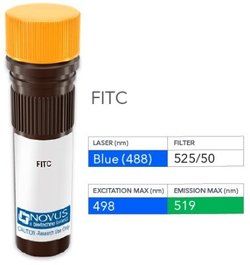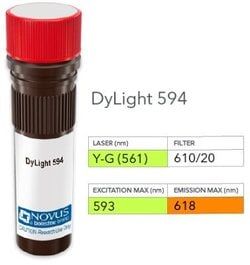B7-2/CD86 Antibody (BU63), DyLight 594, Novus Biologicals™
Manufacturer: Novus Biologicals
Select a Size
| Pack Size | SKU | Availability | Price |
|---|---|---|---|
| Each of 1 | NB006168-Each-of-1 | In Stock | ₹ 56,426.00 |
NB006168 - Each of 1
In Stock
Quantity
1
Base Price: ₹ 56,426.00
GST (18%): ₹ 10,156.68
Total Price: ₹ 66,582.68
Antigen
B7-2/CD86
Classification
Monoclonal
Conjugate
DyLight 594
Formulation
50mM Sodium Borate with 0.05% Sodium Azide
Gene Symbols
CD86
Immunogen
ARH-77 (B-lymphoblastoid cell line)
Quantity
0.1 mL
Research Discipline
Adaptive Immunity, B Cell Development and Differentiation Markers, Cell Cycle and Replication, Dendritic Cell Markers, Diabetes Research, Immunology, Myeloid derived Suppressor Cell
Test Specificity
Recognizes a protein of 70kDa, which is identified as CD86 (HLDA V; WS Code BP BP072. HLDA V; WS Code A A109. HLDA VI; WS Code BP 95. HLDA VI; WS Code B CD86.9). CD86 is a type I transmembrane glycoprotein and a member of the immunoglobulin superfamily of cell surface receptors. It is expressed at high levels on resting peripheral monocytes and dendritic cells and at very low density on resting B and T lymphocytes. CD86 expression is rapidly upregulated by B cell specific stimuli with peak expression at 18 to 42 hours after stimulation. CD86, along with CD80/B71, is an important accessory molecule in T cell co-stimulation via its interaction with CD28 and CD152/CTLA4. Since CD86 has rapid kinetics of induction, it is believed to be the major CD28 ligand expressed early in the immune response. It is also found on malignant Hodgkin and Reed Sternberg (HRS) cells in Hodgkin's disease.
Content And Storage
Store at 4°C in the dark.
Applications
Western Blot, Flow Cytometry, ELISA, Immunohistochemistry, Immunocytochemistry, Immunofluorescence, Immunohistochemistry (Frozen), Immunoassay
Clone
BU63
Dilution
Western Blot, Flow Cytometry, ELISA, Immunohistochemistry, Immunocytochemistry/Immunofluorescence, Immunohistochemistry-Frozen, Knockout Validated
Gene Alias
Activation B7-2 antigen, B70, B7-2, B7-2 antigen, B-lymphocyte activation antigen B7-2, BU63, CD28 antigen ligand 2, CD28LG2B7-2 antigen), CD86 antigen, CD86 molecule, CTLA-4 counter-receptor B7.2, FUN-1, LAB72, MGC34413, T-lymphocyte activation antigen CD86
Host Species
Mouse
Purification Method
Protein G purified
Regulatory Status
RUO
Primary or Secondary
Primary
Target Species
Human, Mouse, Rat
Isotype
IgG1 κ
Related Products
Description
- B7-2/CD86 Monoclonal specifically detects B7-2/CD86 in Human, Mouse, Rat samples
- It is validated for Western Blot, Flow Cytometry, Immunohistochemistry, Immunocytochemistry/Immunofluorescence, Immunohistochemistry-Paraffin, Immunohistochemistry-Frozen, Knockout Validated.


